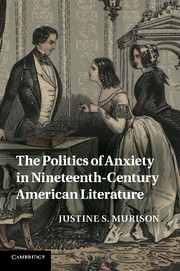Book contents
- Frontmatter
- Contents
- Acknowledgments
- Introduction
- 1 A bond-slave to the mind: sympathy and hypochondria in Robert Montgomery Bird's Sheppard Lee
- 2 Frogs, dogs, and mobs: reflex and democracy in Edgar Allan Poe's satires
- 3 Invasions of privacy: clairvoyance and utopian failure in antebellum romance
- 4 “All that is enthusiastic”: revival and reform in Harriet Beecher Stowe's Dred
- 5 Cui bono?: spiritualism and empiricism from the Civil War to American Nervousness
- Epilogue: the confidences of anxiety
- Notes
- Index
- CAMBRIDGE STUDIES IN AMERICAN LITERATURE AND CULTURE
5 - Cui bono?: spiritualism and empiricism from the Civil War to American Nervousness
Published online by Cambridge University Press: 01 June 2011
- Frontmatter
- Contents
- Acknowledgments
- Introduction
- 1 A bond-slave to the mind: sympathy and hypochondria in Robert Montgomery Bird's Sheppard Lee
- 2 Frogs, dogs, and mobs: reflex and democracy in Edgar Allan Poe's satires
- 3 Invasions of privacy: clairvoyance and utopian failure in antebellum romance
- 4 “All that is enthusiastic”: revival and reform in Harriet Beecher Stowe's Dred
- 5 Cui bono?: spiritualism and empiricism from the Civil War to American Nervousness
- Epilogue: the confidences of anxiety
- Notes
- Index
- CAMBRIDGE STUDIES IN AMERICAN LITERATURE AND CULTURE
Summary
If trance, the involuntary life, and human testimony, were understood universally as they are now beginning to be understood by students of the nervous system, there would not, could not be a spiritist on our planet; for all would know that spirits only dwell in the cerebral cells – that not our houses but our brains are haunted.
George M. Beard, “The Psychology of Spiritism” (1879)How much nervous material can a person lose and still be human? This is the question at the heart of studies such as Marshall Hall's on decapitated frogs and even in mesmerism: At what point does one become nonhuman, an animal, or a puppet? It is also the question physician S. Weir Mitchell tackles in “The Case of George Dedlow,” a story published anonymously in the July 1866 issue of the Atlantic Monthly. As a Civil War surgeon and physician assigned to Turner J. Lane Hospital (a hospital devoted to the study of the nerve injuries so prevalent in the Civil War) Mitchell became preoccupied by phantom limb, a side effect of amputation in which the nerves seemed to report to the brain the continued presence of an amputated limb, a subject he also explores in Gunshot Wounds and Other Injuries of Nerves and Reflex Paralysis (both 1864). As one of the most mysterious effects of the nervous system (both in the nineteenth century and today), the feeling of sensation despite the loss of bodily material occasioned speculations about personal identity, social cohesion, and spiritual connection in nineteenth-century fiction, from Bird's consideration of amputation in Sheppard Lee (1836) and Hawthorne's reference to phantom pain in The Blithedale Romance (1852) to Herman Melville's Moby-Dick (1851) and Mitchell's story of George Dedlow.
- Type
- Chapter
- Information
- Publisher: Cambridge University PressPrint publication year: 2011

